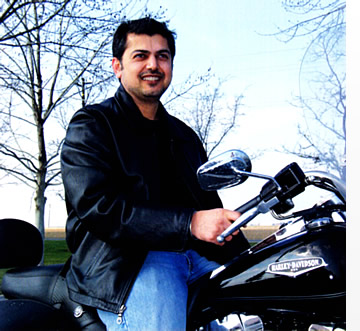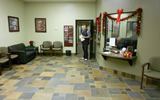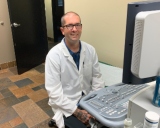Article From Vital Signs - Kaweah Delta Health Care District - March 2008 Issue
 A healthy heartbeat is the foundation of a healthy life. At Kaweah Delta's new Electrophysiology Laboratory, set to open in April, heart specialists and state-of-the-art technology are dedicated to the treatment of patients with irregular heartbeats and other conditions related to the heart's electrical system.
A healthy heartbeat is the foundation of a healthy life. At Kaweah Delta's new Electrophysiology Laboratory, set to open in April, heart specialists and state-of-the-art technology are dedicated to the treatment of patients with irregular heartbeats and other conditions related to the heart's electrical system.
"This leading-edge facility adds a new dimension to the services we provide," says Vinod Gupta MD, Medical Director of Cardiology at Kaweah Delta. "Advances in technology combined with clinical expertise allow us to better diagnose and treat those in need of specialized cardiac procedures. The addition of this lab allows us to provide a complete range of services."
Sukh Bhajal, MD, Electrophysiology Cardiologist at Kaweah Delta, heads the new lab. "My goal is to make sure that the community is aware of the advances in this field, and what we can do to prolong and improve quality of life."
What is cardiac electrophysiology?
Cardiac electrophysiology (EP) is the study of the heart's electrical system. The term "EP study" applies to any procedure that includes the insertion of an electrode catheter into the heart. Electrode catheters are long, flexible wires that transmit electrical currents to and from the heart. Some EP studies are done to diagnose abnormalities, while others are done to access the heart for treatment. In a healthy heart, a natural electrical system controls the rhythmic contractions that keep oxygen-rich blood circulating throughout the body. These electrical impulses are controlled by a group of specialized cells (the sinus node) that act as the heart's natural pacemaker. An abnormal heart rhythm (an arrhythmia) means that the heart beats too slowly, too rapidly, or in an irregular pattern. This diminishes the pumping power of the heart and results in poor circulation. Because the body is not getting the oxygen it needs, shortness of breath, dizziness, palpitations, and other symptoms may occur.
New treatment options
For many patients, treatment includes anti-arrhythmic drug therapy. These drugs can restore a heartbeat to its natural rhythm. Drug treatment is not curative, however and requires the patient to maintain a schedule of follow up care. As with many medications, there are also potential side effects to be taken into consideration. Catheter ablation is a new, non-surgical technique that can permanently correct many types of arrhythmias. Thin, electrode catheters are inserted into a blood vessel, and then gently passed to the heart. The doctor uses the catheters to find and destroy (ablate) "short circuiting" cells within the sinus node. The procedure only takes a few hours and most patients are back to work in a day or two. For other patients, small devices can be implanted in the body during a minor surgical procedure. Pacemakers (also called cardiac resynchronization therapy or CRT) make sure the heart's contractions are timed correctly so more blood is pumped out of the heart. Cardioverter defibrillators (ICDs) are pacemakers with extra features. They correct a too-fast or too-slow heart rhythm. Pacemakers and ICDs are placed just under the skin (the chest is not opened) through an incision below the collarbone. The risks with these implantations are very low and in most cases the procedure only takes about an hour. The new EP lab at Kaweah Delta is dedicated to cardiac ablation, pacemaker and ICD services. "We are very lucky to have recruited Dr. Bhajal last year," says Gupta. "He's extremely qualified, personable, and works with our professional cardiac community to offer a full range of EP services. He's a team player—our cardiac family is now complete."
The more you know
For more information about heart arrhythmias and EP services contact Dr. Bhajal or talk with your doctor. With proper testing and treatment, many of us can live longer, better lives



